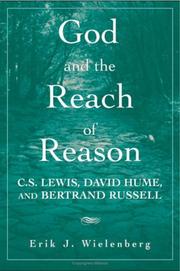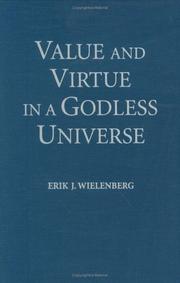| Listing 1 - 8 of 8 |
Sort by
|

ISBN: 0521880866 9780521707107 0521707102 9781139167444 9780521880862 9780511355783 0511355785 0511355262 9780511355264 0511354746 9780511354748 1139167448 9786611153564 661115356X 1107184622 9781107184626 1281153567 9781281153562 0511354169 9780511354168 0511574134 9780511574139 Year: 2008 Publisher: Cambridge New York Cambridge University Press
Abstract | Keywords | Export | Availability | Bookmark
 Loading...
Loading...Choose an application
- Reference Manager
- EndNote
- RefWorks (Direct export to RefWorks)
C. S. Lewis is one of the most beloved Christian apologists of the twentieth century; David Hume and Bertrand Russell are among Christianity's most important critics. This book puts these three intellectual giants in conversation with one another to shed light on some of life's most difficult yet important questions. It examines their views on a variety of topics, including the existence of God, suffering, morality, reason, joy, miracles, and faith. Along with irreconcilable differences and points of tension, some surprising areas of agreement emerge. Today, amidst the often shrill and vapid exchanges between 'new atheists' and twenty-first-century believers, curious readers will find penetrating insights in the reasoned dialogue of these three great thinkers.
Philosophical theology. --- Lewis, C. S., --- Hume, David, --- Russell, Bertrand, --- Philosophical theology --- Theology, Philosophical --- Philosophy and religion --- Theology, Doctrinal --- Hume, David --- Lewis, C. S. --- Russell, Bertrand --- Lewis, Jack, --- Hamilton, Clive, --- Clerk, N. W., --- Lewis, Clive Staples, --- Lʹi︠u︡is, Klaĭv, --- Ruisi, C. S., --- Льюис, Клайв Стейплз, --- Льюис, К. С. --- לואיס, קליב סטפלס --- C. S. ルイス, --- Luvīs, Sī. Is., --- Luwīs, Sī. Is., --- لويس، سى. اس. --- Arts and Humanities --- Religion

ISBN: 9781139165433 9780521845656 9780521607841 0511109911 9780511109911 0511109601 9780511109607 9781107140967 110714096X 0521845653 0521607841 1107386071 1280422203 1139165437 0511171722 0511197519 051129882X Year: 2005 Publisher: Cambridge Cambridge University Press
Abstract | Keywords | Export | Availability | Bookmark
 Loading...
Loading...Choose an application
- Reference Manager
- EndNote
- RefWorks (Direct export to RefWorks)
Suppose there is no God. This might imply that human life is meaningless, that there are no moral obligations and hence people can do whatever they want, and that the notions of virtue and vice and good and evil have no place. Erik J. Wielenberg believes this view to be mistaken and in this book he explains why. He argues that even if God does not exist, human life can have meaning, we do have moral obligations, and virtue is possible. Naturally, the author sees virtue in a Godless universe as different from virtue in a Christian universe, and he develops naturalistic accounts of humility, charity, and hope. The moral landscape in a Godless universe is different from the moral landscape in a Christian universe, but it does indeed exist. Value and Virtue in a Godless Universe is a tour of some of the central landmarks of this under-explored territory.
Atheism --- Religion and ethics --- Values --- Axiology --- Worth --- Aesthetics --- Knowledge, Theory of --- Metaphysics --- Psychology --- Ethics --- Ethics and religion --- Philosophy --- Agnosticism --- Free thought --- Irreligion --- Religion --- Secularism --- Theism --- Religion and ethics. --- Atheism. --- Values. --- Arts and Humanities
Digital
ISBN: 9781139165433 Year: 2005 Publisher: Cambridge Cambridge University Press
Abstract | Keywords | Export | Availability | Bookmark
 Loading...
Loading...Choose an application
- Reference Manager
- EndNote
- RefWorks (Direct export to RefWorks)
Digital
ISBN: 9781139167444 Year: 2007 Publisher: Cambridge Cambridge University Press
Abstract | Keywords | Export | Availability | Bookmark
 Loading...
Loading...Choose an application
- Reference Manager
- EndNote
- RefWorks (Direct export to RefWorks)
Book
ISBN: 0230223842 0230223850 9780230223844 9780230223851 Year: 2009 Publisher: Basingstoke Palgrave Macmillan
Abstract | Keywords | Export | Availability | Bookmark
 Loading...
Loading...Choose an application
- Reference Manager
- EndNote
- RefWorks (Direct export to RefWorks)
Religion --- Philosophy --- philosophy of religion --- analytic philosophy --- divine attributes --- origin of the universe --- evolution and design --- religious doctrine --- morality
Periodical
Year: 2012 Publisher: New York ; Basingstoke Palgrave Macmillan
Abstract | Keywords | Export | Availability | Bookmark
 Loading...
Loading...Choose an application
- Reference Manager
- EndNote
- RefWorks (Direct export to RefWorks)
Book
ISBN: 9780367135652 Year: 2020 Publisher: Abingdon Routledge
Abstract | Keywords | Export | Availability | Bookmark
 Loading...
Loading...Choose an application
- Reference Manager
- EndNote
- RefWorks (Direct export to RefWorks)
Book

ISBN: 9004301658 Year: 2015 Publisher: Leiden : Brill Rodopi.
Abstract | Keywords | Export | Availability | Bookmark
 Loading...
Loading...Choose an application
- Reference Manager
- EndNote
- RefWorks (Direct export to RefWorks)
Are C. S. Lewis’s major arguments in defense of Christian belief sound? In C. S. Lewis’s Christian Apologetics: Pro and Con , defenders and critics of Lewis’s apologetics square off and debate the merits of Lewis’s arguments from desire, from reason, from morality, the “trilemma” argument for the divinity of Christ, as well as Lewis’s response to the problem of evil. By means of these lively, in-depth debates, readers will emerge with a deeper understanding and appreciation of today’s most influential Christian apologist.
Apologetics. --- Lewis, C. S. --- Criticism and interpretation.
| Listing 1 - 8 of 8 |
Sort by
|

 Search
Search Feedback
Feedback About UniCat
About UniCat  Help
Help News
News